George Orwell, born Eric Arthur Blair in 1903, was a celebrated novelist, essayist, journalist and critic, most renowned for his seminal works, “Animal Farm” (1945) and “Nineteen Eighty-Four” (1949).
After attending Eton, Orwell opted for the Indian Civil Service, becoming a policeman in Burma in 1921, an experience that fueled his first novel, “Burmese Days”.
Leaving the police, he lived among tramps, the poor and the homeless in London and Paris, documenting his experiences in his first non-fiction book, “Down and Out in Paris and London”.
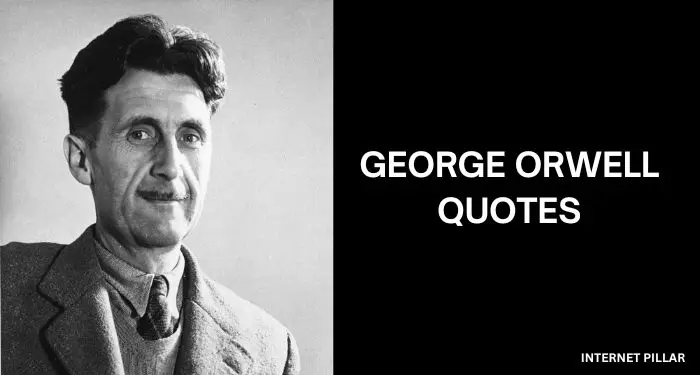
His democratic socialist convictions inspired his political writing and played an influential role in works like “The Road to Wigan Pier” and “Homage to Catalonia”. “Animal Farm” and “Nineteen Eighty-Four” became global icons of literature, translated worldwide and offering a stark critique of totalitarianism.
Related: Dale Carnegie Quotes and Eckhart Tolle Quotes.
Orwell died from tuberculosis in 1950.
I have curated the top list of quotes by George Orwell below.
Top George Orwell Quotes
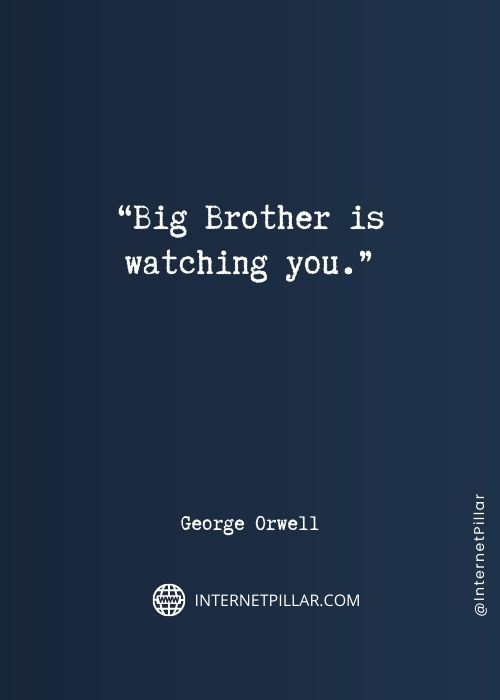
1. “Big Brother is watching you.” ~ (George Orwell).
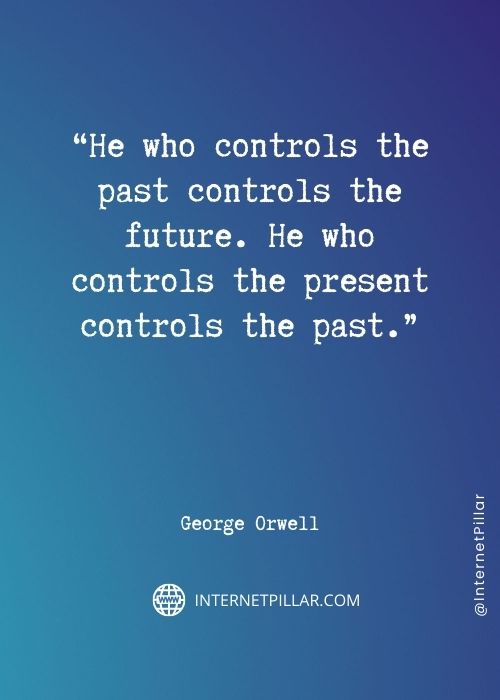
2. “He who controls the past controls the future. He who controls the present controls the past.” ~ (George Orwell).
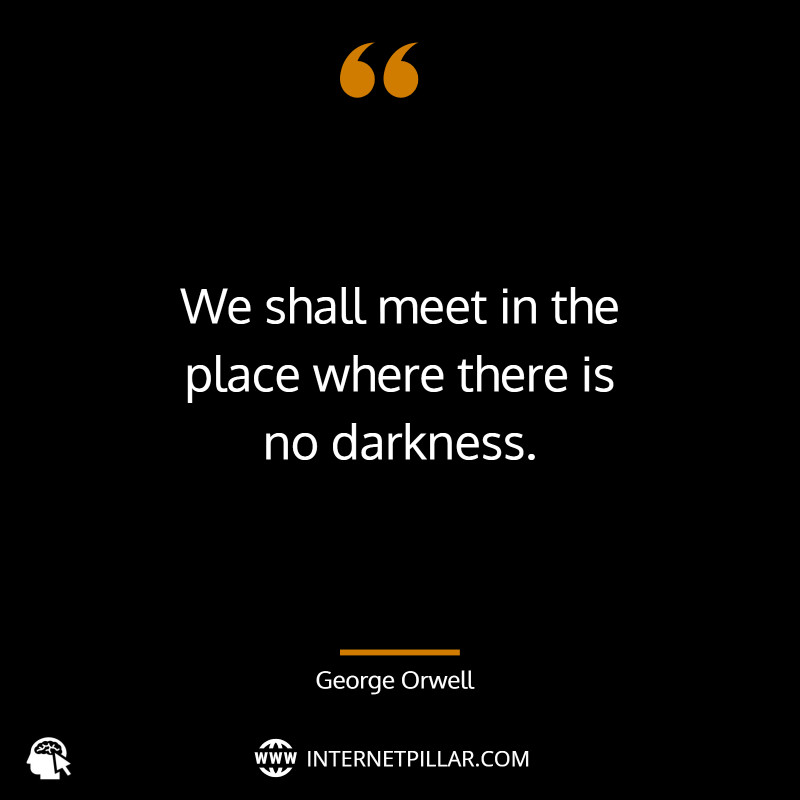
3. “We shall meet in the place where there is no darkness.” ~ (George Orwell).
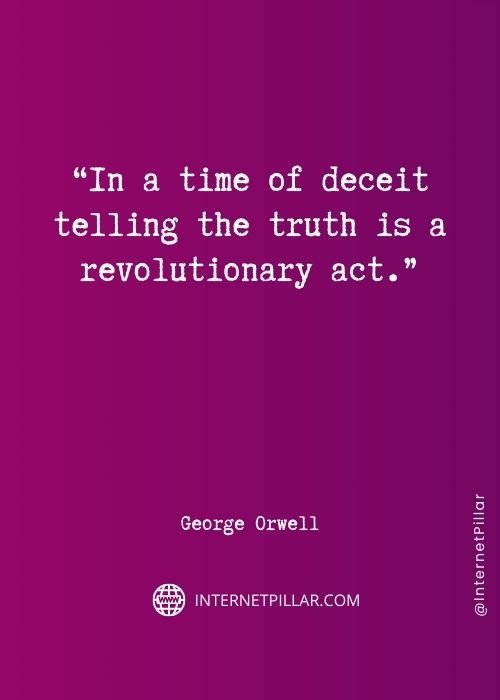
4. “In a time of deceit telling the truth is a revolutionary act.” ~ (George Orwell).
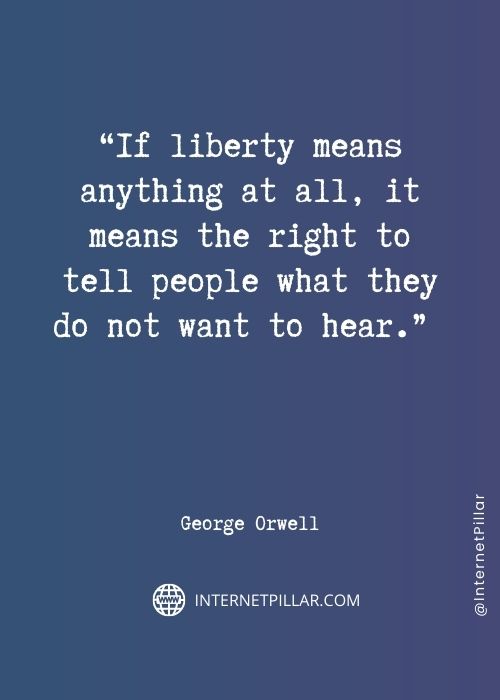
5. “If liberty means anything at all, it means the right to tell people what they do not want to hear.” ~ (George Orwell).
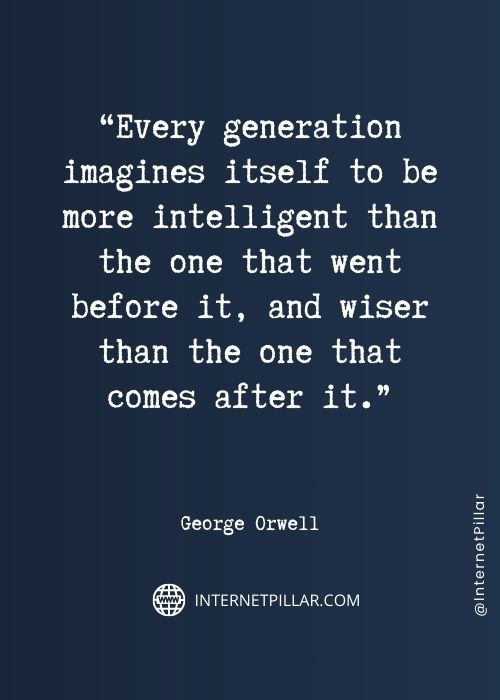
6. “Every generation imagines itself to be more intelligent than the one that went before it, and wiser than the one that comes after it.” ~ (George Orwell).

7. “Journalism is printing what someone else does not want printed. Everything else is public relations.” ~ (George Orwell).
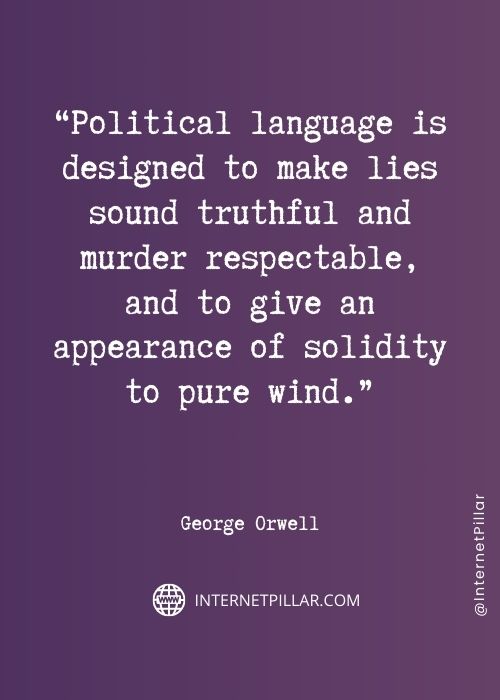
8. “Political language is designed to make lies sound truthful and murder respectable, and to give an appearance of solidity to pure wind.” ~ (George Orwell).
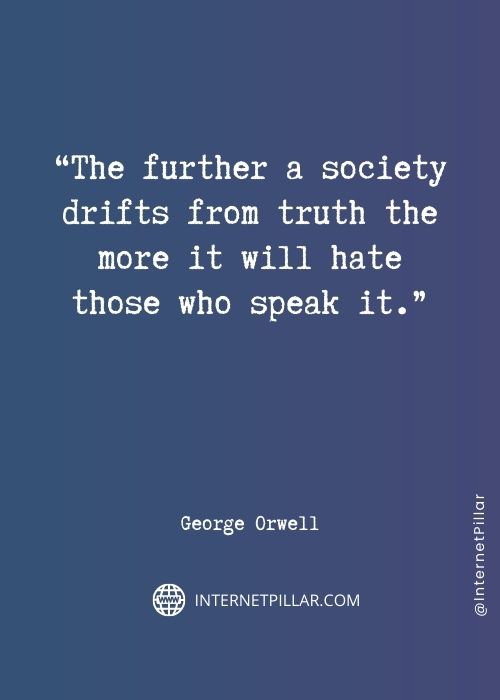
9. “The further a society drifts from truth the more it will hate those who speak it.” ~ (George Orwell).
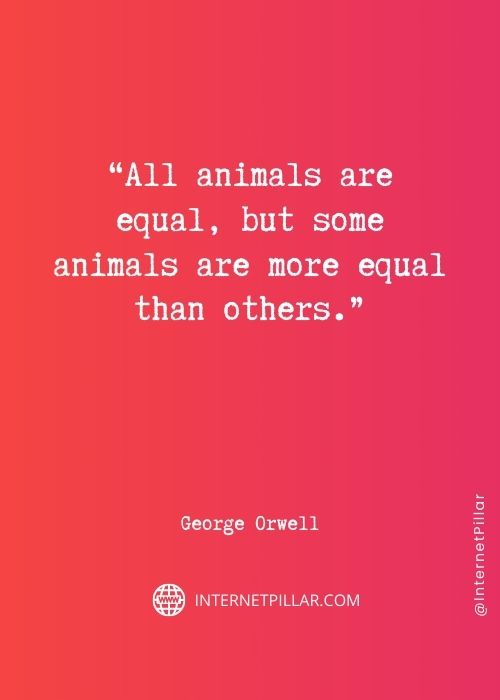
10. “All animals are equal, but some animals are more equal than others.” ~ (George Orwell).
11. “The most effective way to destroy people is to deny and obliterate their own understanding of their history.” ~ (George Orwell).
12. “Perhaps one did not want to be loved so much as to be understood.” ~ (George Orwell).
13. “Writing a book is a horrible, exhausting struggle, like a long bout with some painful illness. One would never undertake such a thing if one were not driven on by some demon whom one can neither resist nor understand.” ~ (George Orwell).

14. “War is peace. Freedom is slavery. Ignorance is strength.” ~ (George Orwell).
15. “Freedom is the freedom to say that two plus two make four. If that is granted, all else follows.” ~ (George Orwell).
16. “Sanity is not statistical.” ~ (George Orwell).
17. “If you want to keep a secret, you must also hide it from yourself.” ~ (George Orwell).
18. “Until they became conscious they will never rebel, and until after they have rebelled they cannot become conscious.” ~ (George Orwell).
19. “Doublethink means the power of holding two contradictory beliefs in one’s mind simultaneously, and accepting both of them.” ~ (George Orwell).
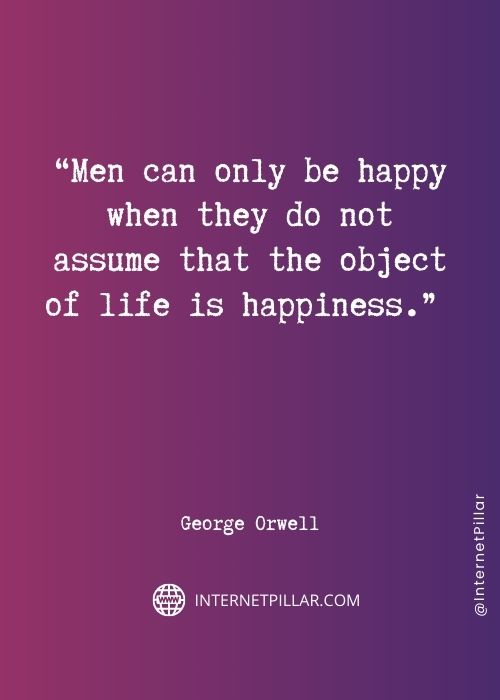
20. “Men can only be happy when they do not assume that the object of life is happiness.” ~ (George Orwell).
Best George Orwell Quotes
21. “The choice for mankind lies between freedom and happiness and for the great bulk of mankind, happiness is better.” ~ (George Orwell).
22. “If you want a vision of the future, imagine a boot stamping on a human face – forever.” ~ (George Orwell).
23. “If people cannot write well, they cannot think well, and if they cannot think well, others will do their thinking for them.” ~ (George Orwell).
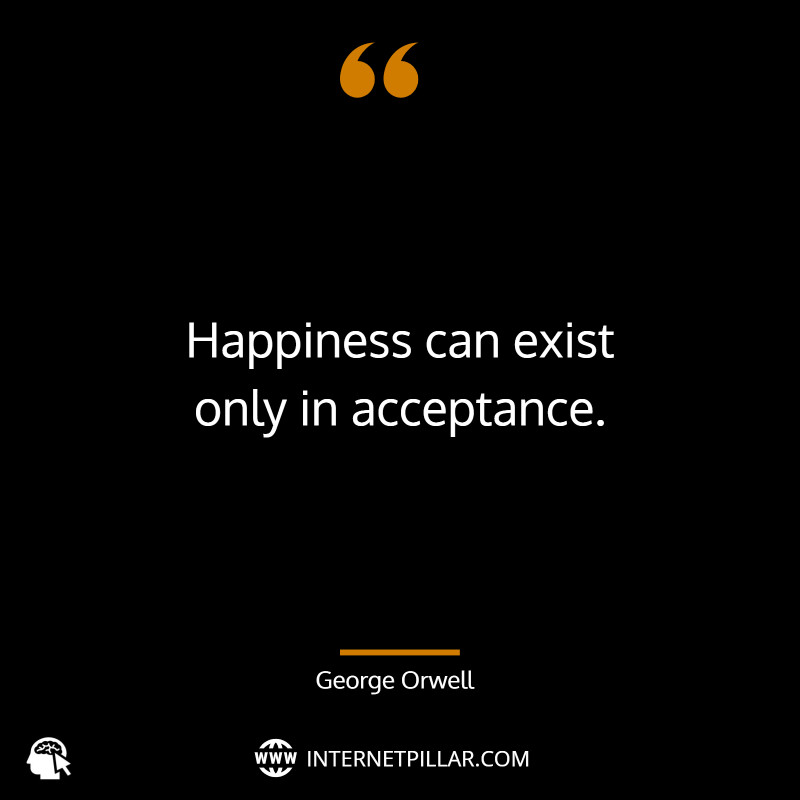
24. “Happiness can exist only in acceptance.” ~ (George Orwell).
25. “People sleep peaceably in their beds at night only because rough men stand ready to do violence on their behalf.” ~ (George Orwell).
26. “We know that no one ever seizes power with the intention of relinquishing it.” ~ (George Orwell).
27. “To see what is in front of one’s nose needs a constant struggle.” ~ (George Orwell).
28. “The people will believe what the media tells them they believe.” ~ (George Orwell).
29. “The past was erased, the erasure was forgotten, the lie became the truth.” ~ (George Orwell).
30. “When I sit down to write a book, I do not say to myself, ‘I am going to produce a work of art.’ I write it because there is some lie that I want to expose, some fact to which I want to draw attention, and my initial concern is to get a hearing.” ~ (George Orwell).
31. “Free speech is my right to say what you don’t want to hear.” ~ (George Orwell).
32. “He wears a mask, and his face grows to fit it.” ~ (George Orwell).
Famous George Orwell Quotes
33. “Rich people are poor people with money.” ~ (George Orwell).
34. “If there is hope, it lies in the proles.” ~ (George Orwell).
35. “A society becomes totalitarian when its structure becomes flagrantly artificial: that is, when its ruling class has lost its function but succeeds in clinging to power by force or fraud.” ~ (George Orwell).
36. “I understand HOW. I do not understand WHY.” ~ (George Orwell).
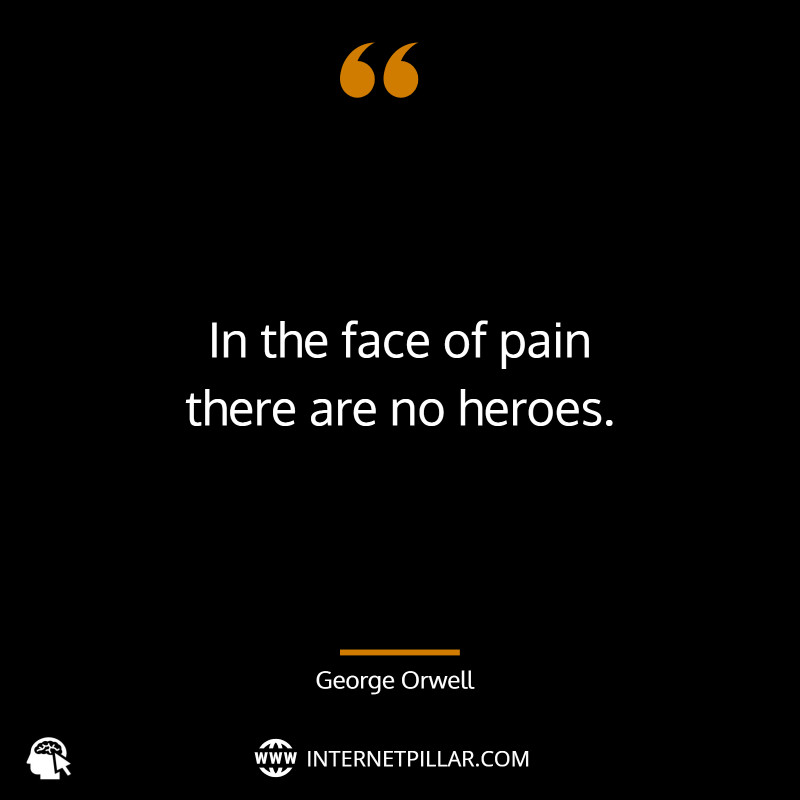
37. “In the face of pain there are no heroes.” ~ (George Orwell).
38. “The enemies of intellectual liberty always try to present their case as a plea for discipline versus individualism. The issue truth-versus-untruth is as far as possible kept in the background.” ~ (George Orwell).
39. “It’s not so much staying alive, it’s staying human that’s important. What counts is that we don’t betray each other.” ~ (George Orwell).
40. “Being in a minority, even in a minority of one, did not make you mad. There was truth and there was untruth, and if you clung to the truth even against the whole world, you were not mad.” ~ (George Orwell).
41. “He was a lonely ghost uttering a truth that nobody would ever hear. But so long as he uttered it, in some obscure way the continuity was not broken. It was not by making yourself heard but by staying sane that you carried on the human heritage.” ~ (George Orwell).
42. “But if thought corrupts language, language can also corrupt thought.” ~ (George Orwell).
43. “You must try harder. It is not easy to become sane.” ~ (George Orwell).
44. “Don’t you see that the whole aim of Newspeak is to narrow the range of thought? In the end, we shall make thoughtcrime literally impossible, because there will be no words in which to express it.” ~ (George Orwell).
45. “We have now sunk to a depth at which restatement of the obvious is the first duty of intelligent men.” ~ (George Orwell).
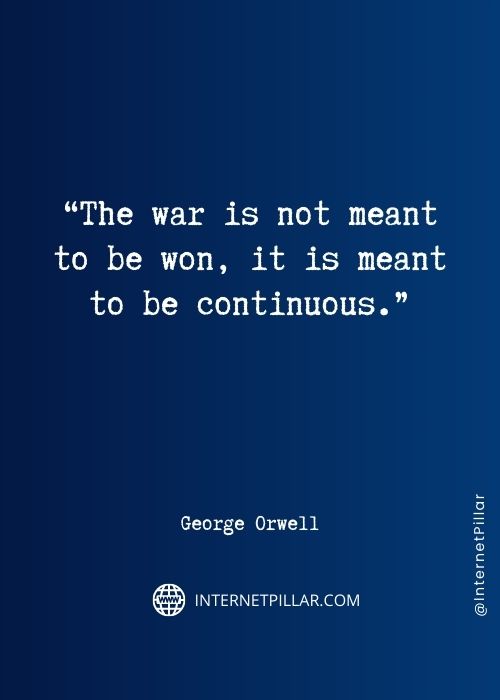
46. “The war is not meant to be won, it is meant to be continuous.” ~ (George Orwell).
Inspiring George Orwell Quotes
47. “The essence of being human is that one does not seek perfection.” ~ (George Orwell).
48. “But it was alright, everything was alright, the struggle was finished. He had won the victory over himself. He loved Big Brother.” ~ (George Orwell).
49. “That rifle on the wall of the laborer’s cottage or working class flat is the symbol of democracy. It is our job to see that it stays there.” ~ (George Orwell).
50. “Freedom of the Press, if it means anything at all, means the freedom to criticize and oppose.” ~ (George Orwell).
51. “The creatures outside looked from pig to man, and from man to pig, and from pig to man again; but already it was impossible to say which was which.” ~ (George Orwell).
52. “Under the spreading chestnut tree I sold you and you sold me –.” ~ (George Orwell).
53. “This life we live nowadays. It’s not life, it’s stagnation death-in-life. Look at all these bloody houses and the meaningless people inside them. Sometimes I think we’re all corpses. Just rotting upright.” ~ (George Orwell).
54. “It was a bright cold day in April, and the clocks were striking thirteen.” ~ (George Orwell).
55. “All tyrannies rule through fraud and force, but once the fraud is exposed they must rely exclusively on force.” ~ (George Orwell).
56. “Power is in tearing human minds to pieces and putting them together again in new shapes of your own choosing.” ~ (George Orwell).
57. “Four legs good, two legs bad.” ~ (George Orwell).
58. “Right thinking will be rewarded, wrong thinking punished.” ~ (George Orwell).
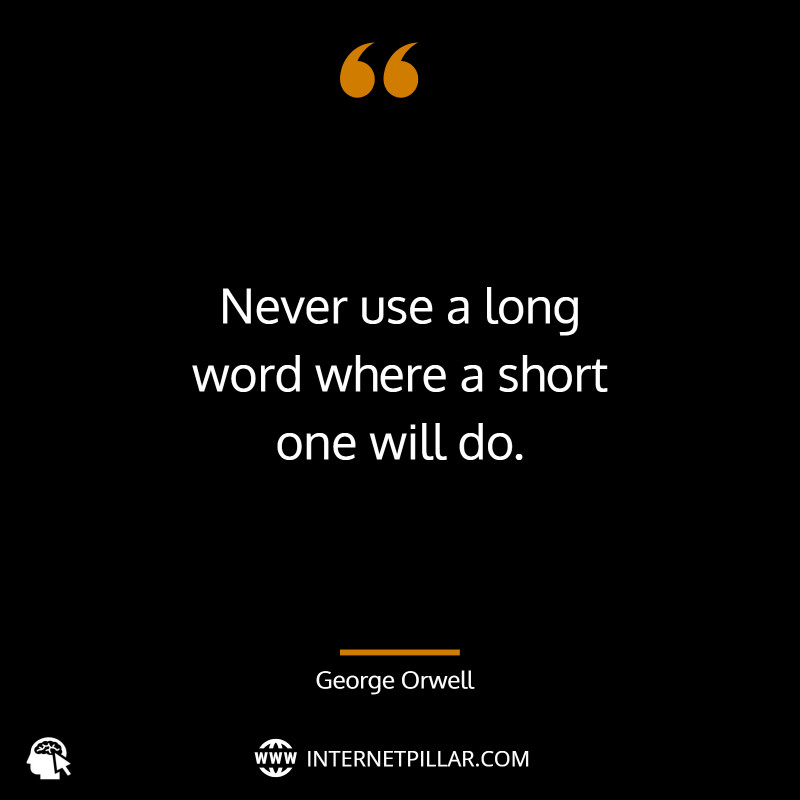
59. “Never use a long word where a short one will do.” ~ (George Orwell).
60. “If you can feel that staying human is worthwhile, even when it can’t have any practical result whatsoever, you’ve beaten them.” ~ (George Orwell).
Short George Orwell Quotes
61. “Progress is not an illusion, it happens, but it is slow and invariably disappointing.” ~ (George Orwell).
62. “Nationalism is power-hunger tempered by self-deception.” ~ (George Orwell).
63. “All art is propaganda; on the other hand, not all propaganda is art.” ~ (George Orwell).
64. “Real power is achieved when the ruling class controls the material essentials of life, granting and withholding them from the masses as if they were privileges.” ~ (George Orwell).
65. “There is no swifter route to the corruption of thought than through the corruption of language.” ~ (George Orwell).
66. “If you loved someone, you loved him, and when you had nothing else to give, you still gave him love.” ~ (George Orwell).
67. “War is evil, but it is often the lesser evil.” ~ (George Orwell).
68. “Oceania was at war with Eurasia; therefore Oceania had always been at war with Eurasia.” ~ (George Orwell).
69. “Good prose should be transparent, like a windowpane.” ~ (George Orwell).
70. “Perhaps a lunatic was simply a minority of one.” ~ (George Orwell).
71. “To survive it is often necessary to fight and to fight you have to dirty yourself.” ~ (George Orwell).

72. “It’s a beautiful thing, the destruction of words.” ~ (George Orwell).
73. “If it is possible to cut a word out, always cut it out.” ~ (George Orwell).
74. “Thoughtcrime does not entail death: thoughtcrime is death.” ~ (George Orwell).
75. “In general, the greater the understanding, the greater the delusion; the more intelligent, the less sane.” ~ (George Orwell).
George Orwell Quotes for Motivation
76. “In real life, it is always the anvil that breaks the hammer…” ~ (George Orwell).
77. “History has stopped. Nothing exists except an endless present in which the Party is always right.” ~ (George Orwell).
78. “Reality exists in the human mind, and nowhere else.” ~ (George Orwell).
79. “The fight against bad English is not frivolous.” ~ (George Orwell).
80. “At fifty everyone has the face he deserves.” ~ (George Orwell).
81. “Advertising is the rattling of a stick inside a swill bucket.” ~ (George Orwell).
82. “My best fishing-memory is about some fish that I never caught.” ~ (George Orwell).
83. “The nationalist not only does not disapprove of atrocities committed by his own side, but he has a remarkable capacity for not even hearing about them.” ~ (George Orwell).
84. “Orthodoxy means not thinking – not needing to think. Orthodoxy is unconsciousness.” ~ (George Orwell).
85. “It is a mysterious thing, the loss of faith – as mysterious as faith itself.” ~ (George Orwell).
86. “Every line of serious work that I have written since 1936 has been written, directly or indirectly against totalitarianism and for democratic Socialism as I understand it.” ~ (George Orwell).
87. “In our time political speech and writing are largely the defense of the indefensible.” ~ (George Orwell).
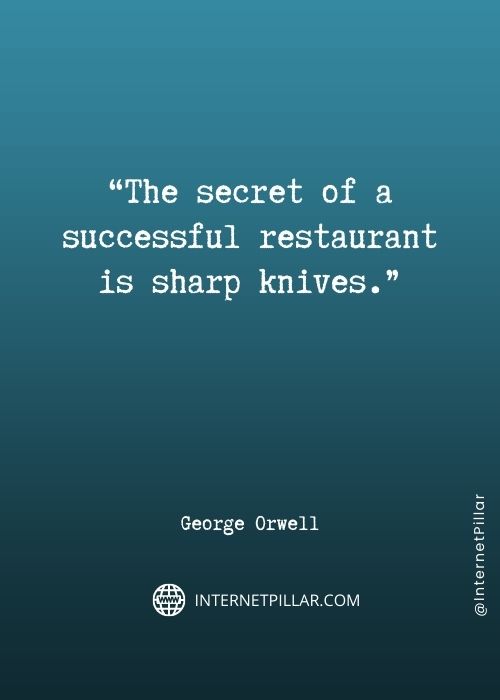
88. “The secret of a successful restaurant is sharp knives.” ~ (George Orwell).
89. “Serious sport is war minus the shooting.” ~ (George Orwell).
90. “The main motive for nonattachment is a desire to escape from the pain of living, and above all from love, which, sexual or non-sexual, is hard work.” ~ (George Orwell).
91. “High sentiments always win in the end. The leaders who offer blood, toil, tears and sweat always get more out of their followers than those who offer safety and a good time. When it comes to the pinch, human beings are heroic.” ~ (George Orwell).
92. “Sooner or later a false belief bumps up against solid reality, usually on a battlefield.” ~ (George Orwell).
93. “I hate purity, I hate goodness! I don’t want virtue to exist anywhere. I want everyone to be corrupt to the bones.” ~ (George Orwell).
94. “I enjoy talking to you. Your mind appeals to me. It resembles my own mind except that you happen to be insane.” ~ (George Orwell).
95. “We do not merely destroy our enemies; we change them.” ~ (George Orwell).
96. “If you have no money, men won’t care for you, women won’t love you; won’t, that is, care for you or love you the last little bit that matters.” ~ (George Orwell).
97. “The greatest enemy of clear language is insincerity.” ~ (George Orwell).
98. “Threats to freedom of speech, writing and action, though often trivial in isolation, are cumulative in their effect and, unless checked, lead to a general disrespect for the rights of the citizen.” ~ (George Orwell).
99. “The very concept of objective truth is fading out of the world. Lies will pass into history.” ~ (George Orwell).
100. “For, after all, how do we know that two and two make four? Or that the force of gravity works? Or that the past is unchangeable? If both the past and the external world exist only in the mind, and if the mind itself is controllable – what then?” ~ (George Orwell).
101. “Preventive war is a crime not easily committed by a country that retains any traces of democracy.” ~ (George Orwell).
102. “A man may take to drink because he feels himself to be a failure, but then fail all the more completely because he drinks.” ~ (George Orwell).
103. “And if all others accepted the lie which the Party imposed – if all records told the same tale – then the lie passed into history and became truth. ‘Who controls the past’ ran the Party slogan, ’controls the future: who controls the present controls the past.” ~ (George Orwell).
104. “The smell of her hair, the taste of her mouth, the feeling of her skin seemed to have got inside him, or into the air all round him. She had become a physical necessity.” ~ (George Orwell).
105. “The inflated style is itself a kind of euphemism. A mass of Latin words falls upon the facts like soft snow, blurring the outlines and covering up all the details. The great enemy of clear language is insincerity.” ~ (George Orwell).
106. “Confession is not betrayal. What you say or do doesn’t matter; only feelings matter. If they could make me stop loving you-that would be the real betrayal.” ~ (George Orwell).
107. “In philosophy, or religion, or ethics, or politics, two and two might make five, but when one was designing a gun or an aeroplane they had to make four.” ~ (George Orwell).
108. “Stupidity was as necessary as intelligence, and as difficult to attain.” ~ (George Orwell).
109. “In our age there is no such thing as ‘keeping out of politics.’ All issues are political issues, and politics itself is a mass of lies, evasions, folly, hatred and schizophrenia.” ~ (George Orwell).
110. “However much you deny the truth, the truth goes on existing.” ~ (George Orwell).
111. “Now I will tell you the answer to my question. It is this. The Party seeks power entirely for its own sake. We are not interested in the good of others; we are interested solely in power, pure power.” ~ (George Orwell).
112. “International football is the continuation of war by other means.” ~ (George Orwell).
113. “A humanitarian is always a hypocrite.” ~ (George Orwell).
114. “A human being is primarily a bag for putting food into.” ~ (George Orwell).
115. “He loved Big Brother.” ~ (George Orwell).
116. “To die hating them, that was freedom.” ~ (George Orwell).
117. “Serious sport has nothing to do with fair play. It is bound up with hatred, jealousy, boastfulness, disregard of all rules and sadistic pleasure in witnessing violence. In other words, it is war minus the shooting.” ~ (George Orwell).
118. “Nothing was your own except the few cubic centimetres inside your skull.” ~ (George Orwell).
119. “The real division is not between conservatives and revolutionaries but between authoritarians and libertarians.” ~ (George Orwell).
120. “The word Fascism has now no meaning except in so far as it signifies ‘something not desirable.’” ~ (George Orwell).
121. “Never use a metaphor, simile, or other figure of speech which you are used to seeing in print.” ~ (George Orwell).
122. “Every life viewed from the inside is a series of defeats.” ~ (George Orwell).
123. “Pacifism is objectively pro-Fascist.” ~ (George Orwell).
124. “Every Joke is a Tiny Revolution.” ~ (George Orwell).
125. “A Socialist United States of Europe seems to me the only worthwhile political objective today.” ~ (George Orwell).
126. “All the papers that matter live off their advertisements, and the advertisers exercise an indirect censorship over news.” ~ (George Orwell).
127. “Those who ‘abjure’ violence can do so only because others are committing violence on their behalf.” ~ (George Orwell).
128. “Thoughtcrime was not a thing that could be concealed forever. You might dodge successfully for a while, even for years, but sooner or later they were bound to get you.” ~ (George Orwell).
129. “Man serves the interests of no creature except himself.” ~ (George Orwell).
130. “The real test of character is how you treat someone who has no possibility of doing you any good.” ~ (George Orwell).
131. “Of pain you could wish only one thing: that it should stop. Nothing in the world was so bad as physical pain. In the face of pain there are no heroes.” ~ (George Orwell).
132. “There are some things only intellectuals are crazy enough to believe.” ~ (George Orwell).
133. “No animal shall kill any other animal WITHOUT CAUSE.” ~ (George Orwell).
134. “Patriotism is usually stronger than class hatred, and always stronger than internationalism.” ~ (George Orwell).
135. “Your worst enemy, he reflected, was your nervous system. At any moment the tension inside you was liable to translate itself into some visible symptom.” ~ (George Orwell).
136. “Rifles, muskets, long-bows and hand-grenades are inherently democratic weapons. A complex weapon makes the strong stronger, while a simple weapon – so long as there is no answer to it – gives claws to the weak.” ~ (George Orwell).
137. “If one harbors anywhere in one’s mind a nationalistic loyalty or hatred, certain facts, though in a sense known to be true, are inadmissable.” ~ (George Orwell).
138. “Manchester is the belly and guts of the nation.” ~ (George Orwell).
139. “If you want to know who rules over you, look at who you are not allowed to criticize.” ~ (George Orwell).
140. “News is something somebody doesn’t want printed; all else is advertising.” ~ (George Orwell).
141. “In this game that we’re playing, we can’t win. Some kinds of failure are better than other kinds, that’s all.” ~ (George Orwell).
142. “If you want to keep a secret, you must also hide it from yourself. You must know all the while that it is there, but until it is needed you must never let it emerge into your consciousness in any shape that can be given a name.” ~ (George Orwell).
143. “Donkeys live a long time. None of you has ever seen a dead donkey.” ~ (George Orwell).
144. “It is a feeling of relief, almost of pleasure, at knowing yourself at last genuinely down and out. You have talked so often of going to the dogs – and well, here are the dogs, and you have reached them, and you can stand it. It takes off a lot of anxiety.” ~ (George Orwell).
145. “Beauty is meaningless until it is shared.” ~ (George Orwell).
146. “War is war. The only good human being is a dead one.” ~ (George Orwell).
147. “To an ordinary human being, love means nothing if it does not mean loving some people more than others.” ~ (George Orwell).
148. “Patriotism has nothing to do with Conservatism. It is actually the opposite of Conservatism, since it is a devotion to something that is always changing and yet is felt to be mystically the same.” ~ (George Orwell).
149. “And I believe that totalitarianism, if not fought against, could triumph again.” ~ (George Orwell).
150. “Reality exists in the human mind, and nowhere else. Not in the individual mind, which can make mistakes, and in any case soon perishes: only in the mind of the Party, which is collective and immortal.” ~ (George Orwell).
151. “For a creative writer possession of the ‘truth’ is less important than emotional sincerity.” ~ (George Orwell).
Other Famous Writers Quotes
- Jack Ma Quotes
- Tim Ferriss Quotes
- Tony Hsieh Quotes
- Peter Lynch Quotes
- Leonardo da Vinci Quotes
- Brian Tracy Quotes
- Jeff Bezos Quotes
- Stephen Covey Quotes
Short Biography of George Orwell
Eric Arthur Blair, better known by his pen name George Orwell, was an influential English writer famous for his clear prose, social criticism, and stance against totalitarianism.

Orwell authored essays, novels, and journalistic works, with his most notable books being “Animal Farm” and “Nineteen Eighty-Four.”
Born in India and raised in England, he initially served as a policeman in Burma before pursuing a writing career.
| Full Name | Eric Arthur Blair |
| Pen Name | George Orwell |
| Born | 25 June 1903 Motihari, Bengal Presidency, British India |
| Died | 21 January 1950 (aged 46) London, England |
| Resting Place | All Saints’ Church, Sutton Courtenay, Oxfordshire, England |
| Education | Eton College |
| Occupations | Novelist, Essayist, Journalist, Literary Critic |
| Political party | Independent Labour (from 1938) |
| Spouses | Eileen O’Shaughnessy (m. 1936; died 1945); Sonia Brownell (m. 1949) |
| Children | Richard Blair |
| Language | English |
| Genre | Dystopian, Roman à clef, Satire, Literary Criticism, Polemic, Opinion Journalism |
| Subjects | Anti-fascism, Anti-Stalinism, Anarchism, Democratic Socialism |
| Years active | 1928–1949 |
| Notable works | Down and Out in Paris and London (1933); The Road to Wigan Pier (1937); Homage to Catalonia (1938); Animal Farm (1945); Nineteen Eighty-Four (1949) |
Orwell’s experience in the Spanish Civil War and roles during WWII shaped much of his writing.
He gained significant recognition with “Animal Farm” in 1945 and continued to write until his death in 1950.
Quick Facts about George Orwell
- George Orwell was born on June 25, 1903, in Motihari, Bengal, India.
- Orwell’s real name was Eric Arthur Blair.
- He adopted the pen name George Orwell, inspired by the River Orwell in East Anglia.
- Orwell died on January 21, 1950, in London, England.
- His notable works include “Animal Farm” (1945) and “Nineteen Eighty-Four” (1949).
- Orwell’s writings often explore themes of totalitarianism and political authority.
- He first published under his pseudonym in 1933 with “Down and Out in Paris and London.”
- Orwell’s father was a British official in the Indian civil service; his mother was of French descent.
- Raised in an atmosphere of impoverished snobbery, Orwell had a morose and eccentric childhood.
- He attended two of England’s leading schools, Wellington and Eton, the latter where Aldous Huxley taught him.
- Instead of attending university, Orwell joined the Indian Imperial Police in Burma in 1922.
- Disillusioned by imperial rule, Orwell resigned from the police in 1927 to become a writer.
- His experiences in Burma influenced his first novel, “Burmese Days” (1934), and essays like “Shooting an Elephant.”
- Orwell lived among the poor in Paris and London, experiences he used for “Down and Out in Paris and London.”
- His book “The Road to Wigan Pier” (1937) critiques socialism and documents his time with the unemployed miners in northern England.
- During the Spanish Civil War, Orwell fought for the Republicans and was wounded at the Teruel front.
- Orwell’s experiences in Spain led to a lifelong distrust of communism, detailed in “Homage to Catalonia” (1938).
- “Coming Up for Air” (1939) reflects Orwell’s nostalgia and fears of future wars and fascism.
- During WWII, Orwell was deemed unfit for military service and worked for the BBC’s Indian service.
- After leaving the BBC in 1943, Orwell became a literary editor at the Tribune.
- Orwell authored several critical essays and books about English culture and socialism during the 1940s.
- “Animal Farm” was a satirical fable on the Russian Revolution, illustrating how power corrupts.
- “Nineteen Eighty-four,” published in 1949, portrays a dystopian future of perpetual war and surveillance.
- Phrases like “Big Brother is watching you,” and “newspeak” from “Nineteen Eighty-four” have become popular references.
- Orwell’s last years were spent on the Scottish island of Jura, where he wrote “Nineteen Eighty-four.”
- He battled tuberculosis, which eventually led to his death in 1950.
- Orwell never fully abandoned his original name but became widely known by his pseudonym.
- His early education was marked by scholarships and a brief stint under the tutelage of writer Aldous Huxley.
- Orwell initially followed a family tradition into a colonial role but left it behind to pursue writing.
- Orwell’s work often merged personal narrative with biting political commentary.
Top Questions about George Orwell
A: George Orwell’s birth name was Eric Arthur Blair, and he was born in Motihari, Bengal, India.
A: He adopted the pen name George Orwell, inspired by the River Orwell in East Anglia.
A: George Orwell’s notable works include “Animal Farm” published in 1945 and “Nineteen Eighty-Four” published in 1949.
A: “The Road to Wigan Pier” critiques socialism and documents Orwell’s time spent with the unemployed miners in northern England.
A: Disillusioned by imperial rule, Orwell resigned from the Indian Imperial Police in 1927 to become a writer.
A: George Orwell attended Eton, where he was taught by Aldous Huxley.
A: “Nineteen Eighty-Four” portrays a dystopian future characterized by perpetual war, surveillance, and totalitarian rule.
A: His experiences as a police officer in Burma influenced both his first novel “Burmese Days” and essays like “Shooting an Elephant.”
A: Orwell’s last years were spent on the Scottish island of Jura, where he wrote “Nineteen Eighty-four.”



